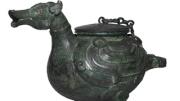This rare bird is a bronze ewer made in China in the Warring States period (481-221 B.C.), a time so called because the Zhou dynasty had lost control of the country, which had split into contending entities vying for supremacy. It lives in the Arthur M. Sackler Museum, part of the University Art Museums, and arrived as an anonymous gift in 1944. It is under the care of Robert D. Mowry, curator of Chinese art and senior lecturer on the history of art and architecture, who places it in the fifth century B.C.
Out from the vessel poured what scholars of Asian art customarily call wine, but what was in fact, explains Mowry, a fermented alcoholic beverage akin to ale, made from grain, not fruit. (Tea as we know it was not prepared and pleasurably drunk in China until the fifth or sixth century A.D.; a thousand years earlier, it was boiled lengthily, often with other substances, and the potent, bitter brew was used medicinally.)
This highly stylized but undoubted duck is part of an exceptionally strong collection of ancient Asian art--holdings that have attracted and nourished generations of scholars. (Its archaic jades are the finest of any collection in the world, including any in China, says Mowry.) Harvard has other bronze vessels in the shapes of animals--a water buffalo, a pair of back-to-back owls, and a tapir--and vessels modeled on bears, elephants, and rhinoceroses exist. Rhinos were native to China (elephants, too), but the Chinese killed them off, mainly because their skin made excellent armor.
The Sackler's richly detailed fowl was made in a foundry by specialized craftsmen using the piece-mold casting technique. They probably cast other ducks virtually identical to this one, but there are no other known survivors. Mowry believes that this ancient quacker is with us today because it spent centuries roosting in a nobleman's tomb.
He presumes that some aristocratic family treasured their ewer much as we might today treasure an elegant silver tea service. Imagine Chinese tipplers of the Warring States period receiving drink from this waddler. Surely they smiled at its sturdy stance, its spinnaker breast--and we share that 2,400-year-old smile as we admire it today.





